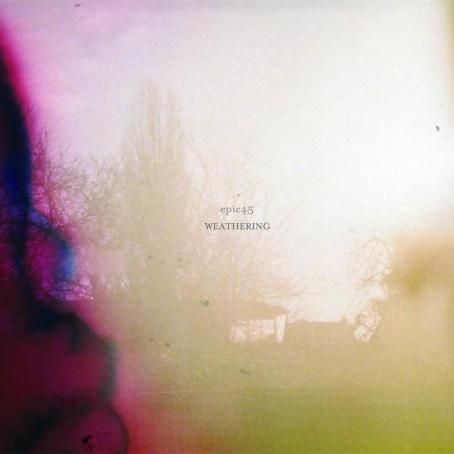Weathering is epic45’s fifth full length release and finds the duo of Ben Holton and Rob Glover producing their strongest work yet. It’s an intensely haunting album, so saturated with sonic and lyrical decay that you can practically smell the damp. Yet it would be a mistake to classify it as a work of hauntology: this is not an album obsessed with past visions of promised futures, but rather of memory’s failure to recover the past. It marks the loss which the march of time inevitably brings and records the way this marks our identity and our landscape. As such, it should be considered a work of nostalgia, but one which transcends the crass romanticism the term has come to be associated with in favour of the geographically affective etymological origin of the term, which comes from the Greek nostos (‘to return home’) and algos (‘to ache’). That’s precisely what you find with Weathering: an intense aching for home, for retreat from the noise of modern life (epic45 live in rural Staffordshire); but it’s an ache that is doomed to go unsatisfied; ‘home’ no longer exists; it’s been swept away by the march of time.
Redemption does appear occasionally, it’s true. Chiming church bells beckon us there in the swooning ‘Summer Message’, with talk of "wind through the pylons" and "snow in a warm park"- but even these are things that "will disappear" This pessimism is reflected in ‘With Our Backs to the City’, where guest singer Stephen Jones (of Babybird fame) discerns that the only way of finding the "green hills / blue skies / yellow fields" he longs for is to "crawl away / under my skin"; a retreat into the self and memory, represented musically through the song’s coda, which plays out like a collaboration between Fennesz and Vangelis. And then there’s ‘These Walks Saved Us’, a song wrapped in a fog of melancholia so that it seems such walks are no longer possible. Ominously, one of the album’s many fine instrumentals is titled ‘The Weather Is Not Your Friend’: its overlaying synth drones and clattering improv drums presenting a far bleaker vision than the images of an Arcadian idyll conjured up by epic45’s previous album: 2007’s May Your Heart Be The Map. Perhaps the album’s defining statement comes in ‘The Village is Asleep’ as Holton folornly intones that ‘time can be unkind sometimes’.
Sonically, Weathering is gently experimental: Robert Wyatt, Bark Psychosis and the blackened ambience of the Miasmah label would all serve as useful reference points, but there’s a clear love of pop music evident too – the spectres of Felt and the C86 movement are strongly felt. Its palette is equally broad: field recordings of bird song and church bells sit alongside violin, clarinet, hammered dulcimer, 80s synths and chiming guitars, with the production adding layers of tape decay and dubby effects. Its success is in the way it ties all this together into a coherent package, with its nostalgia offering a unique – and particularly personal- take on the lineage of pastoral British music documented in Rob Young’s book Electric Eden.
That it manages to achieve this is down to the excellence of the songcraft on display. Holton and Glover have an real gift for writing pop melodies: Weathering is packed with songs which- come second or third listen- seem to have been with you all your life. ‘The Village is Asleep’ is a stunningly emotive work, taking the template laid down by late-period Talk Talk and Bark Psychosis and imbuing it with a heartbreaking beauty that allows it to be mentioned in the same breath as these influences (and it concludes with an unlikely contender for the year’s finest guitar solo: a masterpiece of delicate clarity). The title track, meanwhile, shows epic45’s ability to perfectly sculpt a song- its slowly unfolding counter-rhythms, subtle arrangements and looped phrases building to a crescendo of considerable force.
Despite the unmistakably British feel of Weathering, it’s worth concluding by considering resonances with a very American record: Mercury Rev’s recently rereleased Deserter’s Songs. There are notable musical similarities: the mix of songs and instrumentals; the shaping of broad sonic palettes into pop gems; and the heavy use of guest musicians (as well as Stephen Jones, members of Hood, The Declining Winter, Brave Timbers, July Skies and others lend their talents to Weathering), but it’s the way that both works are clearly born of despair and seek solace in the pastoral environs of home which really makes the two albums speak to each other. Yet where Mercury Rev seemed to find what they were looking for in the Catskill Mountains, the best epic45 offer is a fleeting glimpse of salvation; the occasional burst of sunlight through a blackened sky. They cannot stop time; they will never return to the home they ache so strongly for. Weathering is their collection of deserter’s songs, but a collection for those who – in the words of its title track – are "all messed up with nowhere to go".


